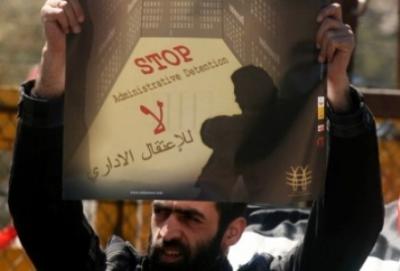
Addameer acknowledges and celebrates the prisoners achievement in the hunger strike and continues to shed light on the ongoing individual hunger strikes against administrative detention
On Monday, 15 April 2019, and after 8 days being on a hunger strike, Palestinian prisoners in Israeli prisons ended their strike. This decision comes after long negotiation sessions between the prisoners’ representatives and the prison administration which ended with an agreement between the two. The prisoners were able to achieve some of their main demands, such as cancelling the punitive measures lately taken against them, removing cell jammers from their sections and rooms, installing four public phones in each prison, and improving some of their detention conditions. Despite this achievement, there are six Palestinian administrative detainees who have been on a hunger strike for several weeks protesting administrative detention and demanding their release.
On this Palestinian Prisoners day there are currently around 5500 Palestinian prisoners detained in 17 different prisons and interrogation centers. This number includes 497 administrative detainees. Administrative detention (AD) is a procedure that allows Israeli occupation forces to hold prisoners indefinitely on secret information without charging them or allowing them to stand trial. The Israeli military commander in the West Bank, or the Minister of war for Jerusalemites, issues an administrative detention order for a maximum period of six months, subject to indefinite renewal.
In the occupied Palestinian West Bank, the Israeli army is authorized to issue administrative detention orders against Palestinian civilians on the basis of Military Order 1651. This order empowers military commanders to detain an individual for up to six-month renewable periods if they have “reasonable grounds to presume that the security of the area or public security requires the detention.” On or just before the expiry date, the detention order is frequently renewed. This process can be continued indefinitely.
Administrative detention is the most extreme measure that international humanitarian law allows an occupying power to use against residents of occupied territory. As such, states are not allowed to use it in a sweeping manner. To the contrary, administrative detention may be used against protected persons in occupied territory only for “imperative reasons of security” (Fourth Geneva Convention, Art.78). Article 78 states that “If the Occupying Power considers it necessary, for imperative reasons of security, to take safety measures concerning protected persons, it may, at the most, subject them to assigned residence or to internment.” Thus, the ways in which the administrative detention carried out by the occupation authorities differs in form and substance from those in the Geneva Convention.
Palestinian administrative detainees have resisted this policy in several methods. Only last year those detainees boycotted the military court for over six months in an attempt to protest the use of this policy against them. Currently, there are six Palestinian administrative detainees how have been on a hunger strike for weeks demanding the end of their administrative detention. Addameer visited two of those prisoners who are Hussam al-Ruzza who started his hunger strike on 20 March 2019, and Khaled Farraj who started his hunger strike on 26 March 2019.
The issue of Palestinian prisoners and detainees held in Israeli prisons and detention centers transcends one of individual human rights; it is also one of collective rights of an entire people – the Palestinian people, who continue to be deprived of the right to self-determination and sovereignty – basic fundamentals of international law. All Palestinian political prisoners – regardless of their alleged political affiliations or charges – are entitled to fair trial guarantees under international humanitarian law and international human rights laws. Addameer calls on third state parties to act, and pressure the Israeli occupation authorities to respect the rights of Palestinian prisoners.
Palestinian political prisoners and detainees are systematically subjected to torture and ill-treatment with continued impunity – highlighting the need for more solidarity actions from people around the globe to call for immediate release of all Palestinian political prisoners, long-denied their basic rights.